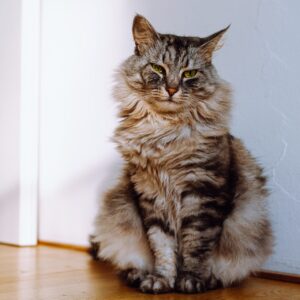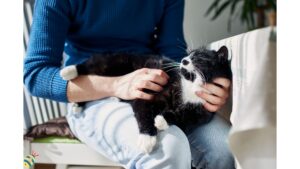Cat lovers and owners are both familiar with the grace and cleanliness cats carry themselves with. Felines are very cautious about their hygiene and like to keep themselves washed, groomed, and polished at all times.
This is why cat flatulence may be surprising and often goes unnoticed.
Reasons Why Cats Fart
The reason behind the occasional toot from your cat is the same as for humans; excess gas created in the gut that needs to be expelled. While it is true that stress and anxiety affect the immune system, digestive tract, and eating habits and may indirectly be linked to farting, it is more likely a coincidence that they appear nervous or scared during that moment.
Farting is, for the most part, not a consequence of your cat being afraid but rather a normal and healthy way for them to pass gas. Although this holds true for older cats, kittens do experience accidental farting.
This is because exhilarating emotions like nervousness, excitement, and thrill cause their stomachs to churn (much similar to humans in a scary situation), which leads to flatulence.
Cat parents have reported witnessing this when leaving their kittens at a groomer, putting them in a carrier, or giving them their favorite toy. As they grow older, they are more in control of this habit, and it rarely occurs.
What are some other reasons that cause flatulence in cats?

While there are multiple reasons your cat might need to pass gas during the day, some of the most common ones are diet-related and not a cause for concern. Below are some reasons mentioned to determine whether you need a medical professional’s opinion or just change a few feeding habits:
Diet Inadequacies or Intolerances
Cats’ bodies are best suited to digest protein-based diets. However, store-bought cat foods vary significantly.
Some are perfect for a diet full of fiber and high in carbohydrate content, while others are tailored to a wheat-free calorie intake. The latter is most recommended if your cat is intolerant to grain present in wet food and kibble as well.
Surprisingly, some cats may also be lactose intolerant, which is hard to tell without tests since they still like the taste of milk or cream. Therefore, it is best to consult a veterinarian if your cat has been gassy or constipated more than usual.
Variations in Nutrient Intake

Cat owners are accustomed to how sensitive their felines’ digestive systems are, which is often what makes them fussy after a new diet plan. Therefore, excess flatulence is common in adult cats shifting to a new brand of food, as well as kittens with immature immune systems shifting from their mother’s milk to solid food.
Professionals suggest that mixing the old food with some of the new food gradually so that the body can adjust to it makes the transition much easier. Furthermore, it is best to test a new diet for at least six to eight weeks before replacing it with another so that the digestive system is not affected by frequent diet variations.
Eating Habits
Some stray cats have a habit of swallowing their food quickly, especially if they grew up in an environment where food was scarce. Unfortunately, eating at a fast pace also means that your pets swallow more air with their food which leads to a build-up of gas.
This could explain why your cat has an upset stomach. In order to overcome this problem, it is best to give them food in small portions over time or use an automatic slow feeder.
A little more attention to their eating habits and schedules could bring a positive change to their irregular digestion.
Stressors in Surroundings
As mentioned earlier, the mood may not directly relate to the frequency of flatulence in a cat, but it does affect the gut. In stressful situations, the adrenaline in their system may be responsible for an excess of gas in their stomachs, but they may also be allergic to certain elements in their surroundings.
Some such irritants which they could have inhaled or come into contact with include cigarette smoke, cleaning supplies, and mold.
Health Issues
If all of the above possibilities have been ruled out and the extra gassiness cannot be traced back to diet, then it is best to consider that your furry companion has a bacterial infection, a digestive disorder, or has picked up a parasite. This is least likely if the only symptom is highly noticeable flatulence, but if it is accompanied by vomiting or diarrhea, then it is best to get a professional’s advice.
Why does my cat fart when I pick it up?
 It is a common occurrence for kittens as well as adult cats, to fart when an owner picks them up every now and then. Fortunately, for all cat parents, your cat passing wind when you pick them up has more to do with when and how you’re picking them up than their bond with you.
It is a common occurrence for kittens as well as adult cats, to fart when an owner picks them up every now and then. Fortunately, for all cat parents, your cat passing wind when you pick them up has more to do with when and how you’re picking them up than their bond with you.
A common mistake that new cat parents make when picking up their pets is doing it in a way that puts too much pressure on their bellies. The applied pressure causes the gas often trapped in their tummy region to be released.
Another reason may be poor timing; for example, picking your cat right after a satisfying meal or right before they’re about to use the litter box may cause them to experience flatulence. This happens because their digestive systems are in prime functioning zones both after eating and before freshening up.
Conclusion
Flatulence in cats is no different from humans except that it is less frequent and rarely noticeable as they have fewer bacteria in their gut breaking down the digested protein, and therefore, less gas is produced. It is often random, with the leading cause being diet adjustments, allergens, and intolerances.
Mood stressors, anxiety, or nervousness are often the least likely contributors to an unusually gassy feline companion. Despite this, it is best to express these concerns to a veterinarian during your cats’ routine checkup to remove any doubts.




